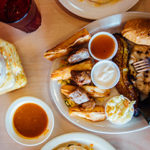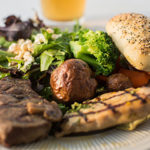 I’m on my way back from New Zealand after an action-packed ‘famil’ trip hosted by Business Events New Zealand that took us from Auckland to the wineries and mountains of the South Island. I’ll write more about the adventure in Convene‘s August issue. I’m still aglow from the warm Kiwi hospitality and creative twists on food and drink. Whether I was eating seared salmon sushi from a street cart for breakfast, or sipping milky oolong at an indoor tea truck, I was often crushing on New Zealanders’ easygoing yet polished approach to food. Here’s my stab at distilling them into a few precepts.
I’m on my way back from New Zealand after an action-packed ‘famil’ trip hosted by Business Events New Zealand that took us from Auckland to the wineries and mountains of the South Island. I’ll write more about the adventure in Convene‘s August issue. I’m still aglow from the warm Kiwi hospitality and creative twists on food and drink. Whether I was eating seared salmon sushi from a street cart for breakfast, or sipping milky oolong at an indoor tea truck, I was often crushing on New Zealanders’ easygoing yet polished approach to food. Here’s my stab at distilling them into a few precepts.
1. Celebrate your culinary assets – and reimagine them from time to time.
It’s true that a visitor to New Zealand will encounter lots of lamb — as well as exquisite wine, olive oil, honey, kumara (sweet potato), and line-caught fish with exotic names such as hapuka and moki. I never tired of these things: The lamb in New Zealand is grass-fed and tender; the wines are elegant; the seafood is ridiculously fresh and plentiful. Rather than become an album on repeat, the chefs in New Zealand draw on their imaginations to constantly recombine these staples into new forms — such as the lamb loin with harissa, golden camera, kale, and foamy goat cheese (shown above) that we were served at Mudbrick Vineyard and Restaurant on Waiheke Island. If your region has an iconic food — whether it’s lobster, chili, or even grits— don’t fret about overdoing it, especially if you can approach it with fresh eyes. Serving regional dishes creates lasting impressions of a place for visitors.
2. Embrace your region’s cultural undercurrents.
Speaking of harissa: New Zealand’s proximity to the Asia-Pacific region, and strong Maori and polyglot culture, mean that all kinds of spices and “exotic” ingredients find a place in the region’s cuisine. Thai, Malaysian, Japanese, Chinese, and Indian flavors and dishes all inflect Kiwi food, which probably has its roots in Britain but seemed intensely farm- (or sea-) to-table with an elegant overlay of spices, sauces, and other ingredients from all over.
3. Don’t dial-in a buffet.
During the International Day at Meetings 2015, a gathering of service providers and planners that kickstarted our trip to Auckland, the ASB Showgrounds put out a spread that was anything but rote: braised Wagyu beef short ribs; roast-chicken sandwiches with apricot and brie; and a flaked, smoked Kahawai salad with egg, chili, ginger, coriander, and saffron rice (shown). It was fresh, delicious, interesting food, and many went back for seconds or thirds.
 4. Constantly rethink appetizers.
4. Constantly rethink appetizers.
Small places, amuse-bouche, and hor d’oeuvres are where chefs can often be the most expressive and creative, and Kiwis have fun with it. During the harborside closing gala for Meetings 2015, appetizer stations were configured around the perimeter of the venue, Shed 10, in such a way that the sense of discovery lasted (for me) a full hour into the party. The morsels, created by chefs at Event Impressions, ran the gamut from soup shooters (pictured) to dumplings to a raw bar piled high with oysters to tiny boats of succulent lamb ribs. Imaginative small plates were a hallmark of the ensuing days, too, from spot-on charcuterie to bite-sized chowders made from paua, aka abalone.
 4. Use drinks to excite, refresh, and unite.
4. Use drinks to excite, refresh, and unite.
The drinking culture in New Zealand is robust, probably because it’s buoyed by a world-class wine industry. Rather than include beverages as a habitual part of the meal, Kiwis seem to offer them up as vehicles for self-expression, fun, and irreverence. We sampled wonderful New Zealand wines almost every day, but also sipped affogatos and flat-whites; imbibed a twist on the Tom Collins made with Kiwi-infused gin; and swarmed Storm & India’s indoor tea truck at Meetings 2015, where planners could get a pick-me-up from ‘Afternoon Detox’ or coconut chai latte after lunch.






